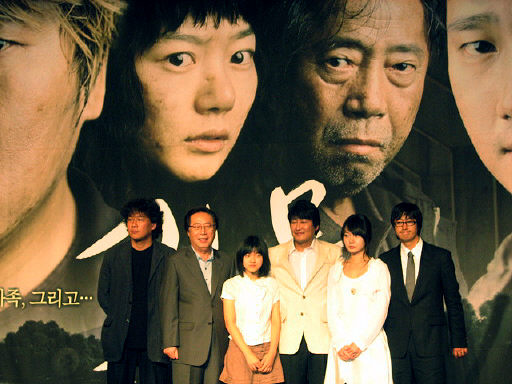 |
Korean film companies see huge drop in profits
Korean film exports to Japan are dropping at a rapid pace, spreading worry throughout the film industry as the Japanese market accounts for the majority of Korean film sales overseas.
Exports to Japan saw a dramatic increase in 2003; by 2004, they totaled 40 million USD, or 69.4 percent of all film exports, and last year they totaled 60 million USD, or 79.4 percent of Korean film exports. This year, however, the trend has come to a standstill. Other than a 300,000 USD prepaid order for "Summer Story" (Yeoreum Iyagi) starring Lee Byung-hyun and three or four sales of "City of Violence" (Jjakpae) for under 100,000 USD, no other contract signings have been reported.
Industry insiders say that as recently as last year, Japanese buyers would occasionally purchase Korean films before they were even completed. Now they only want to discuss deals after seeing the finished product. It is generally expected that sales to Japan this year will be half of what they were in 2005.
"There have been a lot of contracts talked about this year, but nothing final," said Jeong Tae-seong of the distribution company Showbox. "And the amount Japan is willing to pay isn't what it used to be."
Jo Jang-rae of CJ Entertainment says his company sold 12 million USD worth of contracts to Japan in 2005. "So far this year, we've sold only 200,000 USD." "At the Cannes film market, big-name Japanese buyers even suggested the "Korean wave" (Hallyu) might be over," said Mr. Jo. Twenty-nine Korean films were shown in Japanese theaters in 2004. Sixty-one films opened in 2005. That was partly because of the success of films like "Shiri" (2000), "Windstruck" (2004, Nae yeojachingureul sogae hamnida), and "Scandal" (2004), each of which were seen by over one million Japanese viewers, as well as the huge popularity of Korean stars at that time. Other than "A Moment to Remember" (Nae Meori Sogui Jiugae) and "April Snow" (Oechul), few Korean films saw success last year. "Yasu," "Typhoon" (Taepung), "Yeolliji," and "Duelist" (Hyeongsa) have all failed at the box office. "Since early 2004, every other Korean film was a hit in Japan, or if they had Korean stars made popular by the "Korean wave" they would sell over 3 million USD of tickets," said Yi Ae-suk, vice president of the distributor CNQ. "But most of those movies didn't do so well at the box office, and now the mood among Japanese theaters is to not show Korean films at all." Cha Seung-jae of the distributor Sidus is concerned. "Korean films have big budgets, and they can’t be produced with just what they earn in Korea," said Mr. Cha. "The decline in exports to Japan means a crisis for the whole industry." "Part of the problem is sloppy production that is overly dependent on actors who are part of the "Korean wave," but the main reason for the situation we see now is that Korean companies all at once tried to make money in Japan, instead of trying to build reliable partnerships," he said.





